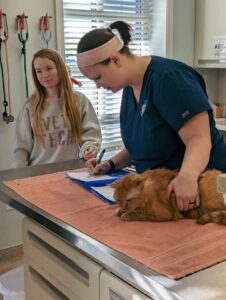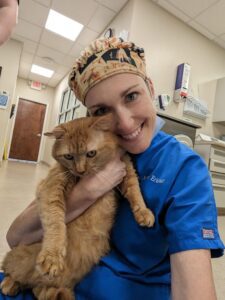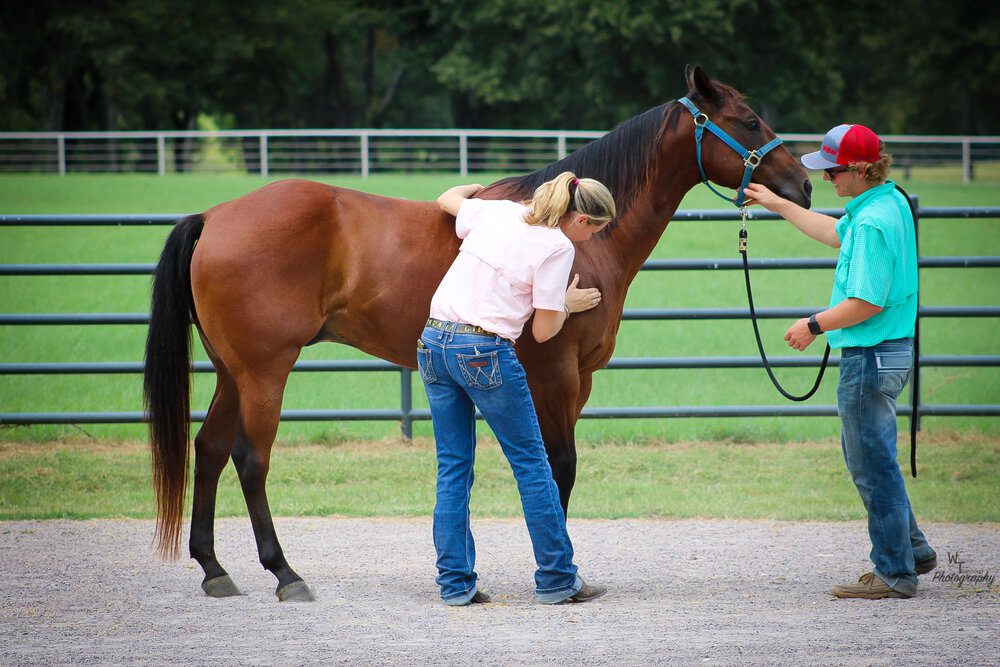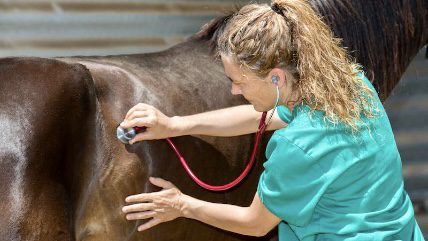The equine world was shocked to learn about the recent and tragic passing of veterinarian and AQHA exhibitor, Dr. Kathleen Lennon, to suicide. In the wake of our collective heartbreak, an important conversation has begun regarding the struggles faced by veterinarians across the country in connection with their stressful, demanding, emotional, and often thankless jobs.
 According to 2022 studies from the Centers for Disease Control and Prevention, 1 out of 6 veterinarians has considered suicide. While male vets are 1.6 times more likely to die by suicide than the general population, female vets are 2.4 times more likely – and 80% of vets are women.
According to 2022 studies from the Centers for Disease Control and Prevention, 1 out of 6 veterinarians has considered suicide. While male vets are 1.6 times more likely to die by suicide than the general population, female vets are 2.4 times more likely – and 80% of vets are women.
Veterinarians are an essential component of our industry and we care deeply about this issue facing our community. We spoke with veterinarian and exhibitor Allison Rassinoux about tips for showing our veterinarians how much we appreciate them in hopes of positively impacting their mental health.
Say Thank You
It seems so very simple to say “thank you,” but Dr. Rassinoux says it is a kindness that is often overlooked, especially when things didn’t go as the owner hoped.
 “Even something as simple as shooting a text after the fact, like,‘thank you for coming out and being there for me’ goes so far. It really is an emotionally and physically draining job and feeling appreciated helps you start the day looking forward to work instead of dreading it.”
“Even something as simple as shooting a text after the fact, like,‘thank you for coming out and being there for me’ goes so far. It really is an emotionally and physically draining job and feeling appreciated helps you start the day looking forward to work instead of dreading it.”
Dr. Rassinoux says that one of the best ways to show appreciation is to leave your vet a positive review – it helps them generate business while showing them appreciation at the same time.
“I print out all of my good reviews and put them on my bulletin board behind my desk so that I can remind myself of the good days when I feel bad or am struggling. They remind me that I am good at my job and people need me to help them and their animals.”
She admits, “Often times, people are the loudest when they are angry and not when they’re grateful. Having people take time to remind you that you are needed makes my day and can completely turn a bad day around.”
Respect Their Time
The round-the-clock nature of veterinary medicine is often a cause for exhaustion and struggles in the personal lives of veterinarians.
 When an animal is in distress, it can be easy to forget what your veterinarian may be sacrificing to assist you: a birthday party, a child’s ball game, a date night, etc. Everyone, no matter their profession, needs a break, but this is especially true where the job doesn’t have standard “business hours.”
When an animal is in distress, it can be easy to forget what your veterinarian may be sacrificing to assist you: a birthday party, a child’s ball game, a date night, etc. Everyone, no matter their profession, needs a break, but this is especially true where the job doesn’t have standard “business hours.”
“I want to remind people that you don’t call your primary care doctor on their personal cell phone after hours – you go to the ER. Obviously, we want to be there for you and your horse, but, it is important to remember that we are human too and sometimes our own life gets in the way of our ability to be there for your animal 24/7 – even though we wish we could be.”
“I’ve received horribly cruel and angry messages from owners that couldn’t reach me when they wanted to. These calls crush me. I want to support your animal and I feel an incredible amount of guilt when I can’t be available for every single call…but, I just have to step away sometimes,” Dr. Rassinoux laments.
 Allison recommends that the best way to respect your vet’s time is to do your best to triage the situation and assess the severity before calling after hours. “Being able to assess whether the situation requires immediate attention or can wait will go a long way to helping your vet maintain their work/life balance.”
Allison recommends that the best way to respect your vet’s time is to do your best to triage the situation and assess the severity before calling after hours. “Being able to assess whether the situation requires immediate attention or can wait will go a long way to helping your vet maintain their work/life balance.”
“Some things simply cannot wait, and veterinarians understand that is part of the job. But, if it is something that could wait for normal business hours, please do your best to take a breath before panic calling your vet,” Dr. Rassinoux requests.
“And if it can’t wait, and you can’t reach your regular vet, please don’t be furious with them. Instead, make sure you have backup trusted practitioners for these rare times so your horse can get emergency treatment, which is the first priority.”
Understand Pricing
Perhaps one of the biggest reasons for friction between veterinarians and their clients centers around the cost of care, which objectively isn’t cheap. But, the pricing isn’t arbitrary or simply a money grab.
“I wish clients could understand the costs that go into maintaining a veterinary practice – there is so much overhead!” Allison exclaims.
 “Many equine vets are mobile. Therefore, the truck and maintenance are an expense. A vet box to put on the back of the truck to have the necessary supplies is an expense (which can be up to $15,000). The supplies and drugs are all out–of–pocket, including very expensive x-ray machines. The cost of the education to be able to provide your animal with care is also over $200,000, plus interest. I will be paying my student loans for a very long time.”
“Many equine vets are mobile. Therefore, the truck and maintenance are an expense. A vet box to put on the back of the truck to have the necessary supplies is an expense (which can be up to $15,000). The supplies and drugs are all out–of–pocket, including very expensive x-ray machines. The cost of the education to be able to provide your animal with care is also over $200,000, plus interest. I will be paying my student loans for a very long time.”
“It is so hard when you have a client who can’t afford your care. We want to comp things and take some of the bill off, but we also have to pay ourselves, and our employees, and our debts to stay in business. It’s a horrible position to be in. Most vets aren’t out there making a fortune, but they do need to make a living,” Dr. Rassinoux reminds us.
Heartfelt Gifts
“I never expect a gift from a client, but whenever I’ve received one, it has meant the world to me. Like, it completely changes my whole day,” Allison says through a smile.
Dr. Rassinoux loves receiving small, heartfelt gifts. “Handmade cards, photos of your pet, a coffee when they come to see your horse after hours, or food around meal time mean the world to us. It is just a way to show us that you’re thinking of us too, because we spend so much time thinking about you and your animal (whether you realize it or not).”
“I’ve cherished these small acts of kindness and they go so far to making me feel good about myself and the care I’m providing.”
Remember to be Kind
Veterinary medicine is the only profession where euthanasia is a regular part of the practice. Most people who enter the field do it because they love animals, so putting these beloved creatures to sleep while their owners suffer takes a serious emotional toll.
 “I do my best for every client and I feel like veterinarians who struggle with mental health feel like they are trying so hard and their best just isn’t good enough. I want people to know that we care so deeply about all of our patients and, unfortunately, we deal with a lot of clients that tell us we don’t. It’s like telling someone that their best isn’t good enough and that is a really hard pill to swallow.”
“I do my best for every client and I feel like veterinarians who struggle with mental health feel like they are trying so hard and their best just isn’t good enough. I want people to know that we care so deeply about all of our patients and, unfortunately, we deal with a lot of clients that tell us we don’t. It’s like telling someone that their best isn’t good enough and that is a really hard pill to swallow.”
Allison advises, “If your vet is late to an appointment, instead of being mad, ask them if everything is okay. Understanding clients are a Godsend in this business. I’ve had people curse me out when I’m late without knowing I’m late because I’ve just come from putting a long-time client’s animal down, and I couldn’t just leave them. Being kind and considerate goes so very far to supporting our mental health.”
Dr. Rassinoux says through tears, “I know our pain is not your pain. Suffering a tragic loss or injury is always the worst for the owner. But if nothing else, I want people to understand that, while we may not feel your exact pain, we are carrying the pain of 100 clients who have suffered a heartbreak…and that gets very heavy. Please be kind to us because our emotional baggage can get very hard…especially when we feel it isn’t appreciated.”
***
The 988 Suicide & Crisis Lifeline is a United States-based suicide prevention network of over 200+ crisis centers that provides 24/7 service via a toll-free hotline with the number 9-8-8. It is available to anyone in suicidal crisis or emotional distress. If you are experiencing suicidal thoughts or are struggling with depression, don’t hesitate to seek help today.
Remember: You are needed. You are loved. You are doing your best. And your life matters.








